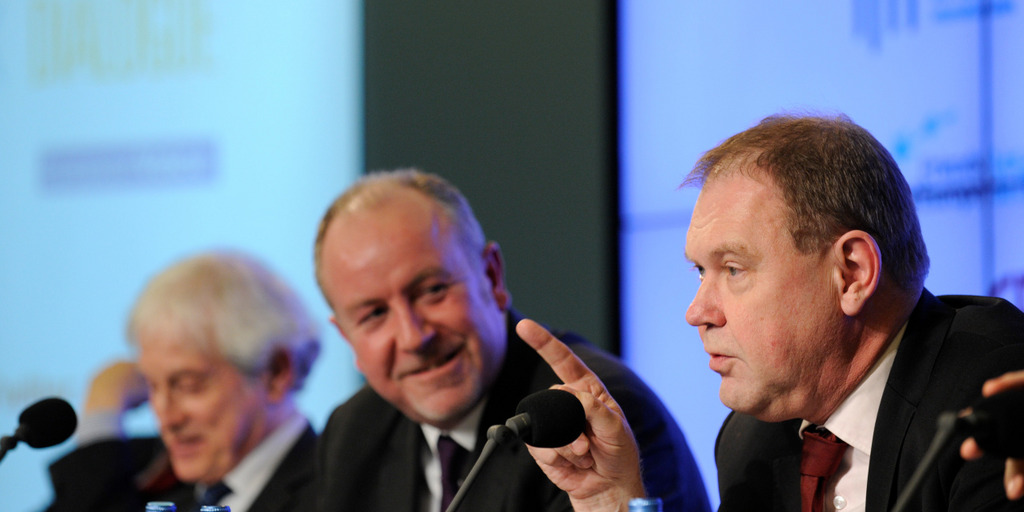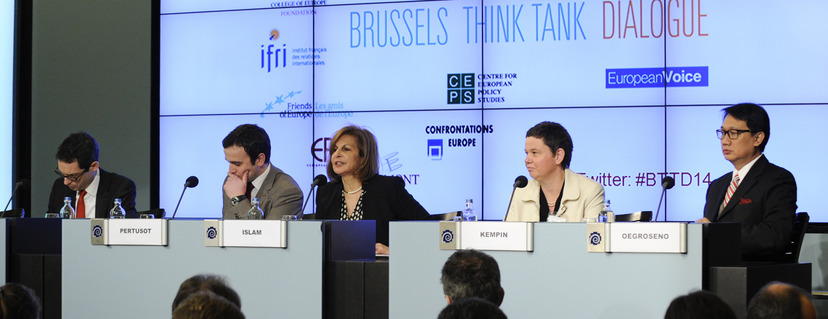The EU needs new leadership with vision. This is the conclusion of the participants of the 5th Brussels Think Tank Dialogue. The event was organised by the Bertelsmann Stiftung and nine other leading think tanks. More than 400 participants from across Europe discussed the challenges facing the new leaders of the EU after the European elections. The experts agreed, for example, that the current gap between the European Parliament and national parliaments had to be closed and that new ways needed to be found to involve EU citizens in Europe.
In his opening speech Aart De Geus (CEO of the Bertelsmann Stiftung) declared that the outlook for this year singles 2014 out as a particularly important year, since the entire leadership of the EU will change following the elections in May. According to De Geus, the outlook for these European elections is far from sunny. Anti-European parties are likely to gain ground due to citizens' loss of faith in the EU, a trend which is likely to create significant obstacles for the decision-making process in Parliament. On the one hand, according to De Geus, EU citizens want a Union which will offer them safety, peace and prosperity - an EU which is capable of taking on a key global role in order to better represent their economic and political interests. On the other hand, they have increasingly high demands concerning the extent to which they should have their say in European policies via democratic participation. The current EU leadership has not managed to win back EU citizens' lost trust in the European project. De Geus stressed the need for action to be taken in this area.
It was against this backdrop that participating think tank partners outlined three key challenges facing the new political leadership of the EU. Debates were then held in three consecutive panel discussions based on the following topics:
- Improved cooperation between the European Parliament and national parliaments in EU affairs
- Completion of the Economic and Monetary Union as well as the European Banking Union
- Setting a new course in European foreign policy
Participants in the first panel discussion agreed that national parliaments have been significantly weakened in the wake of the Eurozone crisis and the resurgence of governmental cooperation. MEP Danuta Hübner went so far as to say that the European Council had excluded the EU Parliament from the decision-making process.
The panel of speakers then laid out a range of different ways in which the role taken by the parliaments could be re-strengthened. Member of the British House of Lords Roger Liddle spoke out in favour of national governments being obliged to answer to national parliaments on EU matters. Michael Link presented one positive example during this discussion. The former German minister of state for the Federal Foreign Office outlined how the German Bundestag gained more influence over their government throughout the course of the Eurozone crisis. The German Federal Government must now seek approval from the Bundestag before taking certain decisions at EU-level.
Giles Merritt (Secretary General of Friends of Europe) touched on the same point in his speech. He suggested that each member of the Commission should henceforth answer to the European Parliament. Sonia Piedrafita from the think tank CEPS on the other hand, put the case for reforming the subsidiarity early warning mechanism for national parliaments and allowing closer collaboration between national parliaments on EU matters.
The start of the second panel discussion on the completion of the European Banking Union and the Economic and Monetary Union (EMU) saw Valerie Herzberg (cabinet member for President of the European Council Hermann van Rompuy) reminding all participants that just a few years ago, no one would have expected this Banking Union. She also mentioned that one step in the right direction had been achieved last December in the form of the compromise reached by EU finance ministers.
Other speakers took a much more critical view. Professor Peter Bofinger from Würzburg University cautioned against being overly optimistic. He suggested that the European Banking Union is by no means the ideal instrument in this context. He also argued that the EMU is still unstable and potentially dangerous because of its numerous member states who are at risk of insolvency. That is why the Eurozone needs a stronger institutional framework, he maintained. Eurobonds were also hailed as being absolutely essential for stabilising state debt.
Eric de Keuleneer from Credible SA argued along the same lines, saying that existing measures did not go far enough. He therefore suggested that the Banking Union should be equipped with its own deposit guarantee facility. He also criticised the model of universal banks as being outdated and doomed to fail. Benoit Lallemand from Finance Watch criticised the European Single Resolution Mechanism (SRM), which was agreed upon in December, as being far too cumbersome. He pleaded the case for changes to be made to this mechanism in order to make it able to react in a much more flexible and timely manner.
The third round of talks focused on key tasks in EU foreign policy. David Cvach from the French foreign ministry put forward his view that despite struggling to overcome some initial problems, the European External Action Service (EEAS) has found its feet. The EU should now be better-equipped to deal with emergencies in countries neighbouring the EU. It was maintained that there is still no clear strategy in sight for a Common European Foreign and Security Policy e.g. with regard to Syria.
Vivien Pertusot from French think tank IFRI argued that member states and the EEAS have shown weakness in dealing with Russia and the Ukraine. He took a dim view of the December summit’s impact on foreign policy, since no tangible results have been seen. He maintained however, that this merits further debate.
According to Ronja Kempin from the German Institute for International and Security Affairs (SWP) the question of which institution will be responsible for European foreign policy is of paramount importance. She believes that there is an urgent need to decide how the EEAS, the Commission and Member States are to work together in this area. One first step could lie in bringing together a core group of Member States who will meet to elaborate the priorities for a Common Foreign and Security Policy.
To close the event, the think tank Directors drew conclusions from the varied discussions held. Bertelsmann Stiftung CEO Aart De Geus was critical of the situation. He found that discussions had made it clear that the EU needs new leadership with vision. He stressed that the current gap between the European Parliament and national parliaments had to be closed and that new ways needed to be found to involve EU citizens in Europe. He argued that Europe’s power base is still very much in capital cities rather than on European level. Furthermore, national policies must be made more European, not vice versa. He also maintained that shortcomings in the current Treaties have created a vicious circle of weak EU leadership.
Philippe Herzog from Confrontations Europe lent his support to the position put forward by De Geus. The current EU architecture is in fact not capable of successfully tackling the challenges to come, he argued. The Director of CEPS Guntram Wolff drew the conclusion that there is no alternative but to amend the EU Treaties. Similarly, SWP-Director Volker Perthes indicated that Treaty amendment may well be the only way to keep the UK in the EU. In a similar vein, Pierre Defraigne from Madariaga called for a new Convention on EU Treaty reform.
About the Brussels Think Tank DialogueThe Brussels Think Tank Dialogue is an annual forum organised by ten leading think tanks. Participants come together to discuss the current state of the European Union and present forward-looking approaches for tackling urgent problems.The partners of the Brussels Think Tank Dialogue are: Bertelsmann Stiftung, Bruegel, Centre for European Policy Studies (CEPS), Confrontations Europe, Egmont Institute, European Policy Centre (EPC), Friends of Europe – Les amis de l'Europe, Institut français des relations internationales (IFRI), Madariaga – the College of Europe Foundation, Stiftung Wissenschaft und Politik (German Institute for International and Security Affairs - SWP).




